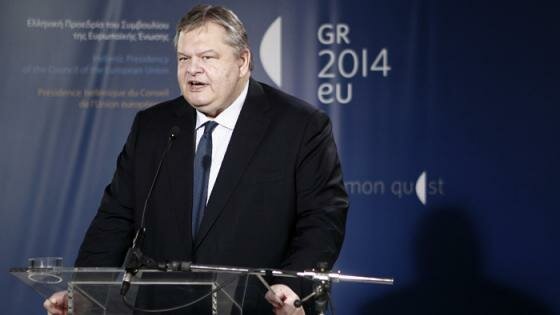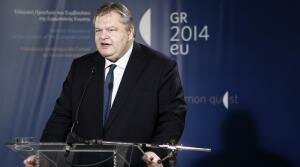- EUThe Presidency (EU)
Briefing of Brussels news media by Deputy Prime Minister and Foreign Minister Venizelos
Good morning. I welcome you to Greece, to Athens, on the day of the official opening of the Hellenic Presidency of the Council of the European Union.
This Presidency is the fifth Hellenic Presidency of the Council since Greece joined the then European Communities in 1981.
The attainments of the previous Presidencies reside mainly in two major issues. The first is the enlargement of the European Union. Because major enlargement waves were associated with our two previous Presidencies. In 1994, when the Hellenic Presidency culminated in the Corfu Summit Meeting, we went from the Europe of 12 to the Europe of 15 member states. We would have had the Europe of 16 if the referendum held at that time in Norway had been positive. And in 2003, during the Presidency that culminated in the Thessaloniki/Halkidiki Summit Meeting, we had the biggest enlargement wave, with the ceremony held here in Athens, and we went to the Europe of 27 and the enlargement policy for the European – Euroatlantic, to be precise – perspective of all the states of the Western Balkans.
The second major attainment is the steps taken in the direction of the institutional integration of the European Union, with our most recent Presidency, in 2003, coinciding with the effort towards the European Constitution, which was not carried through, in the end, but led to the reforms of the Lisbon Treaty; that is, the current institutional architecture of the European Union.
The exercising of the Hellenic Presidency is Greece’s fulfilment of an institutional obligation that it has as a member state of the European Union.
The holding of the Presidency is not a choice. It is an obligation. This provides a response to those who pose the well-intentioned question of how it is possible for the Greece of the crisis – the Greece of the Memorandum, the Greece that is asking its European partners for assistance – to exercise the Presidency of the Council of the European Union.
The foundation of the institutional existence and functioning of the European Union is the principle of the institutional equality of member states, and the strongest symbolic manifestation of the institutional equality of member states, and thus of their sovereignty, their dignity, is the institution of the rotating Presidency of the Council.
Thus, Greece is fulfilling this obligation and projecting the face of an ordinary European country, institutionally equal, that has historically played what I believe is an important role in the process of European integration.
The Hellenic Presidency of the Council of the European Union is precisely European. We have a full sense of the European nature of this mission, and thus we do not see this mission of ours as being of a national nature.
We do not identify our national priorities – which are obvious, because they have to do with overcoming the crisis – with the European priorities that we must serve as the Presidency.
As the Presidency, we will serve the agenda of the Council of the European Union, in cooperation with the permanent Presidencies, which now play a very important role: the permanent Presidency of the European Council; the High Representative, and thus the permanent Presidency of the Foreign Affairs Council; the permanent Presidency of the Eurogroup, for the countries participating in the Eurozone.
We will move in collaboration with the Secretariat General of the Council, in close cooperation with the European Commission, and, of course, in very close cooperation with the European Parliament, the competencies and role of which we fully respect.
This cooperation on our part has already been organized – I think in a very good manner. Moreover, we know that holding the Presidency in the first half of 2014 is a great responsibility for Greece, given that it is a pre-election period.
It is the semester that leads up to the European elections in May for a new European Parliament and the major debate on the choice of the persons who will take up the major political and institutional positions in the European structure.
We will see the opening of the debate on the President of the European Council, the President of the European Commission, the High Representative. So it is very important that the Presidency be exercised during this pre-election semester, which will be short, contracted in parliamentary terms, because the European Parliament will complete its work and its term ahead of the elections.
So we have about four months to use in the legislative and parliamentary procedures with the European Parliament, but this semester will be very intensive and dense in political terms, because the great debate is opening on the future of Europe, on the response to Euroscepticism, on the response we must give to young Europeans who want jobs, opportunities for growth; who want a Europe that means something in their lives.
Naturally, it is obvious that these six months are very critical to us, as Greece, on the national level, because these are the six months of our turnaround out of the crisis, after everything that we have achieved, but this is a matter that concerns the Greek government as one of any of the member-state governments, and not as the Presidency of the Council.
From the materials you have studied and from the briefings you have attended so far, you are aware of the Presidency’s four major priorities.
Naturally, there are more specific priorities in each of the Council configurations; priorities that have been determined in cooperation with the Commission and the corresponding European Parliament Committees.
The Presidency’s main priorities – in brief outline form – are the priorities of all European citizens and all European societies.
The first is growth, the creation of jobs – particularly jobs for the young – and the safeguarding of the European Union’s social cohesion and social dimension. In reality, this is discussed at every meeting of the European Council.
The second major priority – and this is compulsory as well – is the integration of economic governance institutions in the European Union and in the Eurozone, with the critical issue being the banking union, the supervisory mechanism, the resolution mechanism, and the European deposit guarantee mechanism, so that there can really be an open European banking market.
The third priority is the protection of Europe’s borders, mobility, confronting of migration flows. This is something that concerns first and foremost the countries on Europe’s external borders, like Greece; the countries in the South, the Mediterranean; countries with extensive coastlines, like Greece and Italy, or island countries like Malta and Cyprus. You are aware that many important initiatives are being taken currently on the level of the Council and the European Council.
The fourth, horizontal priority is the sea: integrated maritime policy. A policy for blue growth, for the environment, energy, renewable energy sources; for fisheries, for maritime spatial planning, as well as for maritime zones, in accordance with the International Law of the Sea.
Technically, as Mr. Kourkoulas will have the opportunity to explain, we are prepared. You will have the opportunity to visit Zappeion Hall, at which nearly all the events hosted in Athens are to take place. Our Presidency is frugal, it has a limited budget – the smallest in comparison to all the previous Presidencies.
We want to be practical, specific, to fulfil this institutional obligation effectively, so that we can hand it on to the Italian Presidency, which follows ours, and with which we are in very close cooperation, because the Hellenic and Italian Presidencies, together, comprise a Mediterranean year in the European Union.
.









